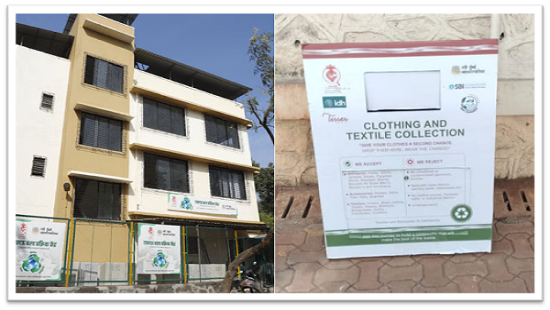
India’s First Municipal Textile Waste Centre in Navi Mumbai Sets a New National Benchmark for Circular Economy Innovation
The emergence of India’s first municipal-supported textile waste processing centre in Navi Mumbai reflects a shift in how urban local bodies are redefining sustainability, community engagement and circular economy models. The Navi Mumbai Municipal Corporation (NMMC) has positioned itself as an early mover in a space that is gaining global relevance, as textile waste becomes one of the fastest-growing components of urban solid waste streams. The recent visit by Union Textile Ministry Secretary Neelam Shami Rao underscores the importance of this initiative and the credibility it has earned at the national level.
The Secretary’s review of operations at CBD Belapur highlighted the centre’s structured approach to waste management and its capacity to convert discarded garments into market-ready products. As Indian cities struggle with rising waste volumes, the Navi Mumbai model offers both a scalable and socially impactful solution.
A Structured, Six-Step System That Raises Operational Standards
At the heart of the centre’s efficiency lies a six-step segregation and fibre-testing system designed to extract maximum value from discarded textiles. Rao inspected each stage of the process, observing how fabric waste undergoes mechanical fibre testing before being reclassified for upcycling or further processing. This level of scientific rigour is unusual for municipal-level waste management facilities and demonstrates how NMMC is integrating industry-standard techniques into civic operations.
Officials accompanying her, including Textile Commissioner Dr. M. Bina, Ministry Director Ashok Jaiswal, and Textile Committee Secretary Kartikeya Dhanda, noted the system’s alignment with global best practices. NMMC’s Additional Commissioner Sunil Pawar, Deputy Commissioner Smita Kale and Textile Committee Director Dr. Tapan Rout were also present, reinforcing the collaboration between municipal leadership and national agencies.
A Model Recommended for Replication Across Urban India
The Secretary’s endorsement carries significance for cities navigating rising waste-management challenges. By congratulating Municipal Commissioner Dr. Kailas Shinde and his team, Rao signalled the project’s readiness for replication. Her suggestion to host a national workshop on textile waste management in Navi Mumbai marks a step toward institutionalising the learnings of this pilot.
Urban India generates nearly 779,000 tonnes of textile waste annually, and municipal systems often lack the capability to segregate and process it. The Navi Mumbai model, a partnership-driven, scientifically managed process, presents a viable alternative to traditional landfill-driven disposal. If replicated, it could ease solid waste loads while promoting local livelihoods.
Community-Led Collection Network Creates a Scalable Supply Chain
The operational backbone of the project is a citywide collection network supported by partnerships with the SBI Foundation and Tisser Artisan Trust. High-footfall areas such as housing societies, malls and offices have been equipped with large collection bins, ensuring a steady and predictable supply of textile waste.
A dedicated collection vehicle transports the material to the Shakuntala Mahajan Multi-Purpose Building in CBD Belapur, where processing and upcycling occur. Three institutions, Seawoods Estate Phase 1, Om Siddhi Tower in Sector 27 Nerul, and Nexus Seawoods Mall in Sector 42, were formally recognised for their significant contributions. This recognition structure encourages more institutions to participate, deepening citizen involvement.
Women-Led Production Adds Livelihood, Skill-Building and Creativity
A major strength of the project lies in its social impact. During her interaction with the women employed at the centre, Rao appreciated how the initiative offers meaningful livelihoods, skill development and creative opportunities. The women at the facility work on converting reusable fabrics into a diverse range of upcycled products through handloom techniques and other artisanal methods.
This aligns with broader national goals of women’s economic empowerment. By integrating skill-based work into the circular economy, the centre demonstrates how environmental sustainability can reinforce social inclusion and job creation.
Upcycling That Generates Market Demand and Citizen Support
Usable discarded fabric is channelled into an upcycling process that produces bags, home décor items, accessories and other textile products. These items are then displayed and sold in local markets, receiving strong citizen support. This demand response has been vital for the centre’s sustainability, validating both the design philosophy and the execution.
The initiative has simultaneously reduced the burden on NMMC’s solid waste management system. Textile waste, which often clogs landfills due to its slow decomposition, is now diverted and transformed into economically viable products. This creates a closed-loop system where waste becomes raw material, and raw material becomes both livelihood and revenue.
Leadership That Reframes Urban Sustainability
NMMC Commissioner Dr. Kailas Shinde emphasised that the project symbolizes the corporation’s commitment to environmentally responsible governance. His commentary highlights how sustainability initiatives can deliver returns that go beyond waste reduction. The strengthened citizen participation, enhanced local employment and improved awareness around textile reuse suggest an evolving cultural shift in urban waste practices.
Navi Mumbai’s textile waste processing centre stands at the intersection of innovation, public participation and social impact. As cities across India confront rising waste volumes and resource constraints, this model provides a replicable blueprint anchored in practical implementation, institutional collaboration and community ownership.
With national-level recognition, a capable operational system and strong citizen engagement, Navi Mumbai has demonstrated how local governments can drive high-impact circular economy initiatives. The centre represents not only a local success story but also a national opportunity to rethink how India processes, reuses and revalue textile waste in the decade ahead.




